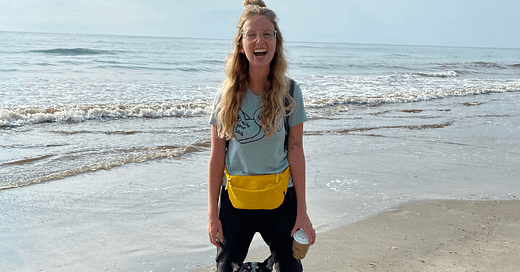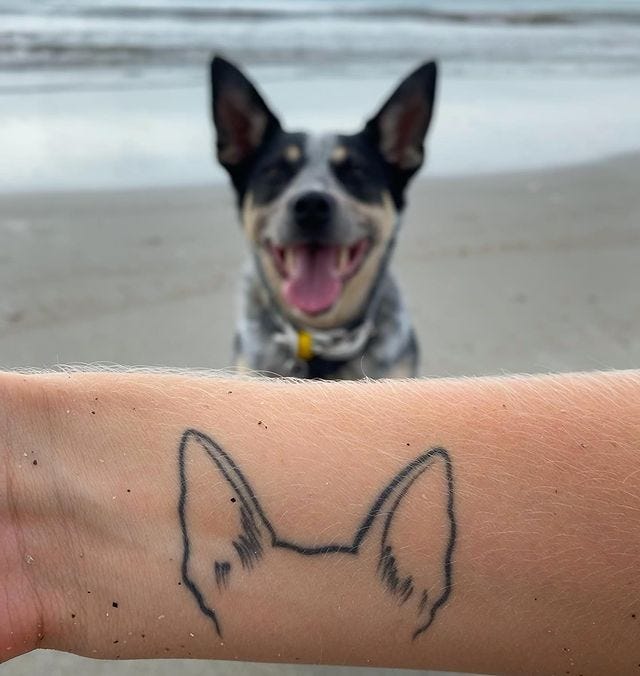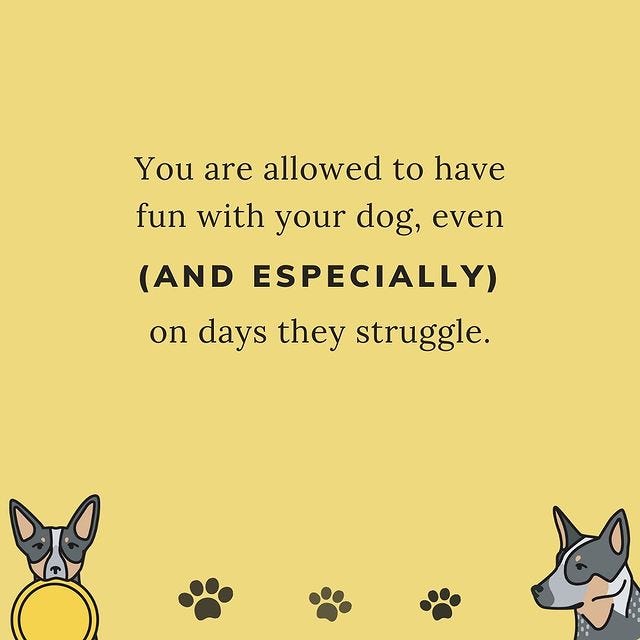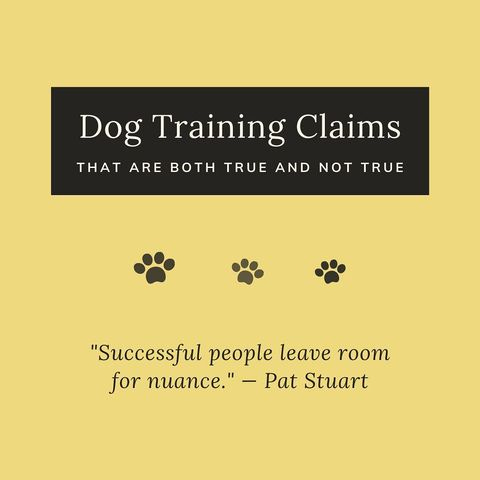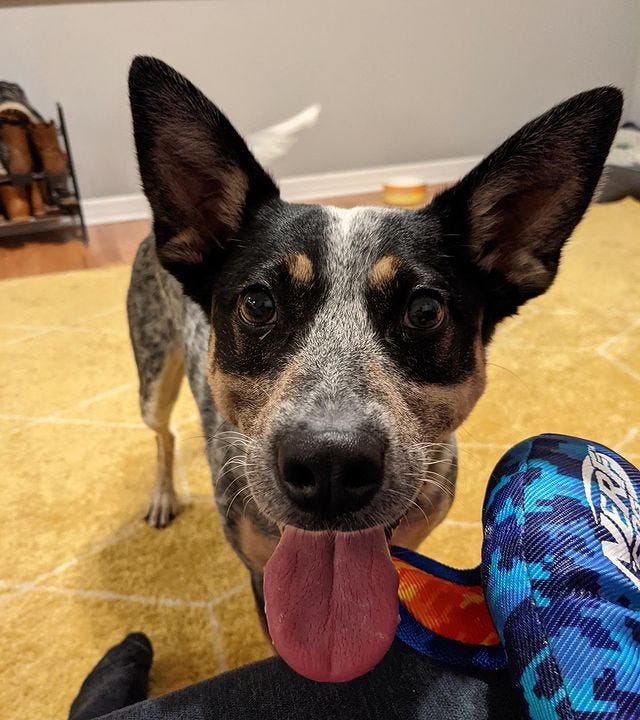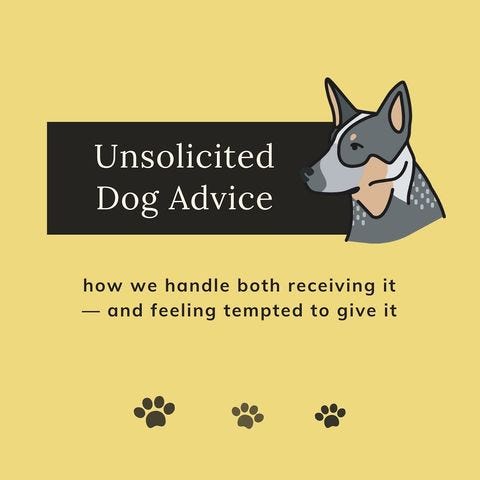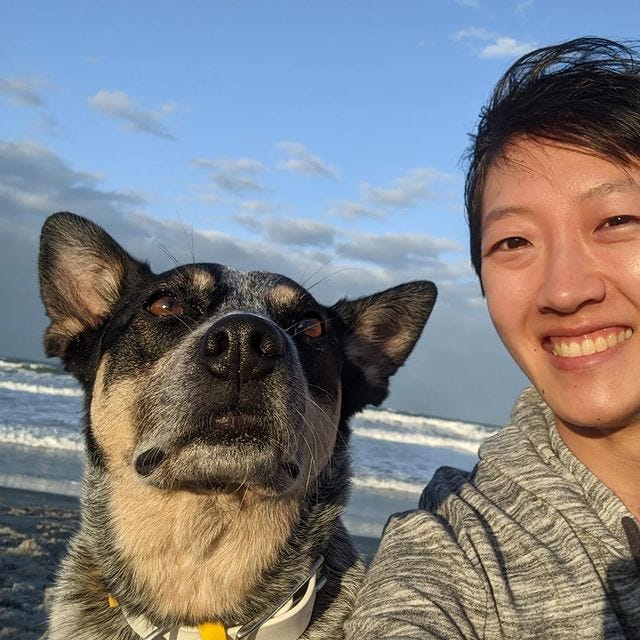“Just” an owner: Do I have any right to talk about dogs?
I am not a professional dog trainer. While I enjoy consuming training and biology and psychology content, I have no certifications (and my hands-on experience is limited).
That said? I think there’s value in us “just owners” sharing, too.
It would be irresponsible for me to say “hey stranger on the internet whose dog I’ve never met, you should do X, Y, and Z.” But it can be helpful to say “we’ve experienced similar things—here’s more about our personal journey.”
We can encourage, inspire, and support fellow owners without pretending to be more than we are. Here’s a look at my thought process to be a responsible voice in the dog training community!
The value in dog owners sharing their experiences
“Just” owners can help fellow dog lovers:
Feel less alone and find a support network
Living with a dog (especially one who is reactive, sick, or otherwise feels difficult to care for) can be isolating. Sometimes it feels like we’re the only ones in the world struggling. Like our dogs are somehow broken. Like we aren’t good enough.
Being exposed to fellow owners going through similar things—or simply having similar emotions even in different situations—can remind us we aren’t alone!
There’s not much more comforting than knowing someone else gets it. Sharing challenging experiences with a community who understands what I’m feeling—fully, deeply, without judgment—brings me so much relief. These owner-to-owner connections are some of my favorite things to come out of having a social media account dedicated to my dog.
Embrace nuance and different perspectives through firsthand anecdotes
Storytelling is incredibly powerful. When we hear a narrative, our brain waves start to synchronize with the person who’s telling it. Talk about connection! This means that anecdotes (while not to be confused with statistically significant data) can have an immense impact on what we learn.
Firsthand accounts from fellow dog owners have enabled me to step out of my own bubble and into someone else’s world. Because of these experiences, I’m more understanding and empathetic. I can readily see things from a range of different perspectives. I’ve come to realize, deep down, that nothing in our world is black and white.
In a world of reductionist claims and sweeping generalizations, I think listening to the varied experiences of our peers is one of the best things we can do. Professional trainers tell valuable stories too—but it’s often easier to feel connected to folks directly in our own shoes.
Connect to other resources
Part of hearing other peoples’ stories? Being exposed to things I might not have found on my own. I stumbled upon so many (important, even life changing) dog training concepts simply because another owner mentioned them in passing. Connecting with a larger community of fellow dog lovers has added so many topics to my “interesting, check this out further” list.
I think this spread of information is especially valuable in online spaces. Social media, blogs, and other ownership forums provide opportunities to consider a wide range of ideas in a variety of circumstances.
Be inspired to do more with our dogs
Finally: I’m simply inspired by fellow dog owners. So many amazing people build incredible lives with their dogs. Getting to watch what other folks do—how they prioritize, what they train, where they adventure, who they become—encourages me to enjoy Scout more deeply.
It’s important to be aware of the “comparison game” pitfall. Sometimes there’s a thin line between “delightful inspiration” and “dangerous envy”. But by and large, I’m energized when I see fellow owners with their companions.
It’s also important to think critically about what information we trust
The dog training industry is not regulated
In the previous section I talk about the value of information spreading online—but there’s a downside, too. Anyone can say anything on the internet.
While the Instagram dog community is full of amazing owners and trainers, it’s also home to people with questionable intentions. Since you don’t need to meet any standardized criteria to claim you’re a professional, it’s often hard to tell who’s who (especially if we’re new to the space).
Is someone truly educated? Are they being honest about their experience? Are they just putting on a facade? How do we know what to learn from… and what to avoid?
Unfortunately, dog owners who pretend to be “more” than they are—who present their individual experiences as across-the-board fact, give outright advice about situations they’ve never been through or researched, and so on—can do more harm than good.
There is a lot of reductionist, contradictory information out there
I also think it’s important to realize that dog training is complicated. Many popular pieces of advice contradict each other. And sifting through mounds of information is no small task—especially when every statement is presented as undeniable fact by a confident online persona.
When dog owners latch onto simple mantras and repeat them without thinking critically, we can actually make things worse for our peers (even if we don’t mean to). Sharing is an amazing thing. Adding to confusion without room for nuance isn’t.
My personal rules to “share responsibly” as a dog owner
You can also read more about the ways I find balance in online communication in this article.
1) Never pretend to be something I’m not
Every time I create a piece of content, I want to be clear that I’m not a pet professional. It’s easy to include short disclaimers at the top of blog articles or end of Instagram carousel posts!
These reminders are especially important to me when it comes to our supporter section of this website. I’ve spent a lot of time considering whether or not it’s “fair” to ask folks to pay for my writing. While I’m comfortable having some high effort pieces behind a paywall, I never want to misrepresent that content.
Supporting our blog is not the same as having lessons with a professional trainer or signing up for online classes. (I do hope it provides a lot of value to fellow owners, of course, but in a different way.)
2) Focus on our personal experiences—don’t give direct advice
Most of my writing focuses on our personal experiences and makes heavy use of first-person pronouns like I, Me, and We. (Sometimes I slip into second person and start making bolder “You” claims, especially if it’s an article that’s been directly requested by a supporter, but I try not to preach.)
This is for a few reasons.
First, our world is too complex for me to tell people what they “should” do most of the time. I’ll talk forever about how we approach things! But besides high-level ideas, I’m not comfortable telling you how to approach them. We make individual decisions based on our personal goals, innate traits, current environment, past experiences, and more. There is no one size fits all!
Second, I think it’s most productive when new perspectives are offered without confrontation. As much as I love talking about dogs and try to be open to feedback, I can still get defensive when someone comes in with a “you should” claim. I never want to make anyone else feel that way if I can help it.
Finally, this ties back to recognizing that I’m not a professional trainer with heaps of hands-on experience. As an invested owner, I absolutely have a right to talk about dogs—but I don’t have a right to directly project my personal experiences on other people.
3) Point people to research and further resources
While I’m generally not comfortable giving fellow owners outright advice, I am happy to direct folks to resources we’ve found helpful. I want to give credit where credit is due! Whenever we talk about nitty-gritty training concepts (like the layered stress model, windows of opportunity, or box feeding), it’s important to share where people can go for more context.
In a way, I like to imagine that I can “be the voice I wish I had” three years ago. Thoughtful content can make complex ideas more accessible. Sean and I can condense information and provide guidance to owners who aren’t sure where to go next.
And we can do that most successfully by not pretending to be the end all be all source of information. (Because after all, there are approximately 158,302 gazillion things I’m still unsure or learning about.)
4) Stay transparent—be honest about the good and bad
Speaking of “the voice I wish I had”, I remember feeling lost and overwhelmed when I first got into the dog world. The handful of people who let me into their lives—who truly showed me the good and the bad, the complex thought processes and the nuanced results—made such a difference.
I want to portray life with Scout as accurately as possible. My goal is that anyone who met her in person after following her online wouldn’t be at all surprised. What you see on Paws and Reflect is what you get in real life! (When our friend Yujia confirmed this for me, I wanted to cry. In a good way.)
This doesn’t mean I share every aspect of our lives, completely unfiltered, all the time. There are some things (like emotional decisions about Scout’s epilepsy or particularly challenging advocacy experiences) that I want to process internally first. And that’s okay!
What’s important is that I fundamentally do not paint an unrealistic “highlight reel” of our time together.


